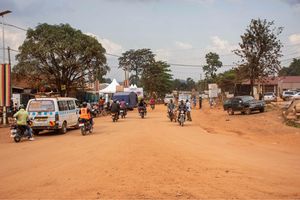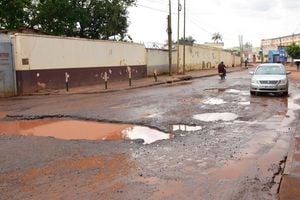Prime
Kyamukama: Ex-poacher who hunted hunters rests

Mr Silver Kyamukama had invaluable knowledge of wildlife and bridged the gap between conservation authorities and local communities. Photo/Courtesy
What you need to know:
- Ms Harriet Kemigisha, who was also trained by Kyamukama, described him as a moving encyclopedia on matters of wildlife and everything that called the forest home.
It’s not every day that someone can engage in illegal activities for an extended period without facing consequences. However, for Silver Kyamukama, who passed away on Wednesday aged 71, poaching—the illegal hunting, capturing, or killing of wildlife—was his daily bread for more than two decades.
For all that time, Kyamukama roamed in the lush, dense forests of Kibale in Kamwenge District, hunting bush pigs, warthogs, antelopes, and elephants, among others. He set his target on anything that wandered through the 180-kilometre corridor connecting Kibale Forest National Park to Queen Elizabeth National Park.
All this, he did, as explained in a 2019 televised interview, because of poverty. The curse of lack drove him deeper into the illegal trade as he needed to feed his family and pay school fees for his children.
A true son of the Bigodi Village in Kibale, Kyamukama grew up in a family where hunting was a way of life. His father, like many in the area, relied on the forest for food and income, selling bush meat to local communities. As a teenager, he would accompany his father on hunting expeditions, learning the skills and techniques that would make him a master poacher.
Kibale Forest, with its vast expanse and rich biodiversity, offered an abundant hunting ground for him. His expertise and proximity to the park made him a formidable poacher, feared by the wildlife and respected by fellow hunters almost in equal measure.
Due to societal pressures of the time, Kyamukama, who only completed Primary Seven at Bigodi Primary School in Kamwenge, was compelled to marry at a young age. As the sole provider for his new family, his passion and determination for hunting grew, driven by the need to make a living.
Despite his background, Kyamukama’s academic pursuits remained undeterred. Over the years, he managed to acquire a more basic education, supported by his modest earnings from hunting. This enabled him to read, write, and speak English quite well.
From Saul to Paul
The gazetting of Kibale Forest from a forest reserve to a national park in the early 1990s marked the beginning of a new chapter in Kyamukama’s life. Uganda National Parks (UNP), a body that later merged with the Game Department to form the current-day Uganda Wildlife Authority (UWA) in 1996, took full control of the Kibale Park.
With their arrival came a wave of conservation messages aimed at protecting wildlife. The UNP started calling out poachers from the bush. The park was now patrolled by wardens, and the community was actively engaging in conservation efforts. During this period, Kyamukama began to reconsider his ways. The increased presence of park wardens and the fear of being caught weighed heavily on him.
UNP’s outreach programmes, which emphasised the importance of conservation and the benefits of protecting wildlife, resonated with him. His turning point came when UNP offered employment opportunities to locals, who had basic education qualifications and a good understanding of English and the local language of the area. Kyamukama saw this as a chance to change his life. Bearing the required qualifications, he applied for the opportunity, and the rest was history.
Kyamukama, once a feared poacher, became a staunch defender of the very animals he once hunted, a story akin to the biblical conversion of Saul to Paul in Acts 9. He would later dedicate his entire life, even after retirement, to conservation.
Fresh beginning
In a move that shocked many, Kyamukama finally hung up his bow and arrow and joined UNP as a ranger. His transition from poacher to protector was hailed as a testament to the power of redemption by Uganda Tourism Board CEO, Lilly Ajarova.
Kyamukama underwent rigorous training, where he learned about the benefits of conserving nature and the vital role of wildlife in maintaining ecological balance. After completing his training, he was deployed back to his home area as a ranger dedicated to protecting wildlife. His intimate knowledge of poacher behaviour proved invaluable in apprehending criminals and dismantling their networks. Kyamukama’s efforts significantly reduced poaching activities in the region, and his story became an inspiration to many.
In his expanded role over the years, he became a bridge between UWA and the local population in Kibale and neighbouring areas. He used his story to educate others about the importance of conservation and the benefits of protecting wildlife. His efforts helped change the perception of conservation within the community, leading to greater cooperation between locals and UWA.
The employment opportunity with UWA also brought about significant changes in Kyamukama’s personal life. He could now afford to educate his children and provide them with a better future. With a relatively stable income, he found newfound stability and success, including building a home among other accomplishments. Reflecting on his old life, he often joked about missing bush meat but lamented that it was nowhere to be found after his efforts in curbing poachers.
Kyamukama retired from his job five years ago and moved into a private wildlife practice. Upon retirement, he worked closely with primatologist Julia Lloyd under the Shadow of Chimpanzees NGO.
His death
Kyamukama’s legacy is one of hope and resilience, demonstrating that even the most hardened individuals can change and contribute positively to society. By turning his life around, Kyamukama showed that with the right support and opportunities, individuals can break free from the cycle of poverty and crime and become champions of change.
Over the years, he conducted extensive research and gathered a wealth of information on tourism and wildlife. His colleague, Gerald Kirungi, a former tour guide, who Kyamukama mentored in Kibale Forest National Park, described the deceased as “a good researcher who took an interest in rare elements.”
Kirungi added: “You would be surprised that he knew a lot about species like butterflies or even tree identification with ease.”
Ms Harriet Kemigisha, who was also trained by Kyamukama, described him as a moving encyclopedia on matters of wildlife and everything that called the forest home.
Kyamukama passed away on Wednesday while being taken to hospital. He had long battled heart complications and high blood pressure, which ultimately claimed his life. He was buried on Thursday at his ancestral home in Bigodi Town Council, Kamwenge District. He is survived by two wives and 14 children.





